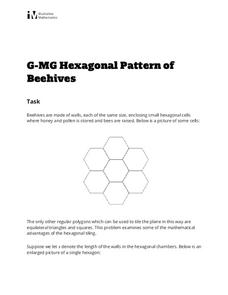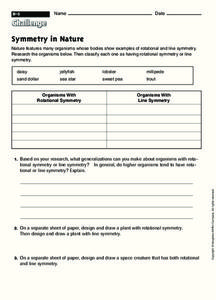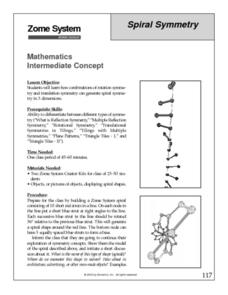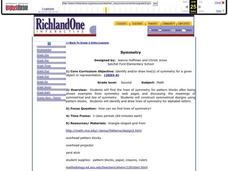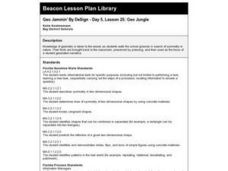Curated OER
Symmetry
Third graders find symmetry in nature. For this symmetry lesson, 3rd graders discover that symmetry is in nature and our everyday world. Students examine the alphabet for symmetrical letters then create their own artwork showing symmetry.
Curated OER
Understanding Symmetry Through Visual Art
Have your class explore symmetry, radial balance and fractional parts in natural and man-made objects in their environment. Learners list examples and identify symmetrical and asymmetrical designs. Pupils are given a box of crayons and...
Curated OER
Symmetry in Nature and Congruent Shapes All Around
Second graders explore symmetry and congruent shapes. For this math lesson, 2nd graders identify examples of symmetry and congruent shapes in nature. Students take photographs and create a multimedia presentation of symmetry and...
Illustrative Mathematics
Hexagonal Pattern of Beehives
Young geometers and biologists investigate the math of nature in an activity that is just the bee's knees. Participants will study the tessellations of hexagons in a beehive, along with the natural rationale behind the specific shape....
John Lentine
Butterflies and Bugs
Symmetry, line, shape, art, and math are all connected through a fun hands-on craft. Included are instructions to a classic activity, where learners create butterflies to show symmetry in nature and then discuss symmetry in math. It is...
Curated OER
Symmetry in Nature
In this symmetry worksheet, students put organisms into categories of having line symmetry or rotational symmetry and answer questions about them. Students put 8 organisms into the chart and answer 3 questions.
Curated OER
Spiral Symmetry
Taking the notion of symmetry to the next level, this looks at combining rotation and translation symmetry to build spiral symmetry in three dimensions. Using the Zome modeling system and an instructor’s guidance, geometers try to build...
Curated OER
Symmetry
Students explore symmetry. In this geometry lesson, student identify and define bilateral symmetry, radial symmetry, pentagonal symmetry, hexagonal symmetry, and cubic symmetry. Students construct examples of these types of symmetry and...
Curated OER
Symmetry
Second graders find the lines of symmetry in pattern blocks and alphabet letters. In this symmetry activity, 2nd graders discuss what symmetry is, view examples of lines of symmetry and apply what they have learned by finding the line of...
Curated OER
A World of Symmetry
Middle schoolers identify lines of symmetry. In this symmetry lesson, students create objects and identify their lines of symmetry. They answer questions about lines of symmetry. Middle schoolers cut shapes out of...
EngageNY
Interpreting Quadratic Functions from Graphs and Tables
Seeing functions in nature is a beautiful part of mathematics by analyzing the motion of a dolphin over time. Then take a look at the value of a stock and maximize the profit of a new toy. Explore the application of quadratics by...
Curated OER
Mathematics in Art?
Fifth graders view prints of M.C. Escher's work. They look at examples of geometric figures and polygons and discuss places they have seen them. Students create their own tessellations. They write a report about the process they used in...
Curated OER
Symmetry: Theory, Reality and Art!
Students explore the concept of geometric symmetry. In this geometric symmetry lesson, students walk around their school and take pictures of objects that demonstrate symmetry. Students use Microsoft Paint to draw the lines of symmetry...
Curated OER
Mandalas : polygons
Fourth graders create mandalas. For this mandala lesson, 4th graders look at these polygons in nature and man-made forms. They create their own by using tangrams.
Inside Mathematics
Graphs (2004)
Show your pupils that perimeter is linear and area is quadratic in nature with a short assessment task that requests learners to connect the graph and equation to a description about perimeter or area. Scholars then provide a...
Curated OER
Geo Jammin' By DeSign - Day 5, Lesson 25: Geo Jungle
Students search the school grounds for examples of symmetry in nature. They bring examples back to the classroom and write about them.
Curated OER
Design Explorations: Frieze Patterns
Middle schoolers will explore frieze patterns. A frieze pattern is a mathematical concept to classify designs on two-dimensional surfaces, which are repetitive in one direction, based on the symmetries in the pattern. They will explore...
Mathematics Vision Project
Module 6: Congruence, Construction, and Proof
Trace the links between a variety of math concepts in this far-reaching unit. Ideas that seem very different on the outset (like the distance formula and rigid transformations) come together in very natural and logical ways. This...
Curated OER
The Dragon Curve Fractal
Learners identify the properties of a dragon curve. In this geometry instructional activity, students identify sequences and patterns as they solve fractals. They investigate patterns found in nature.
Curated OER
Geo Jammin' By DeSign - Day 1, Lesson 1: Math in Motion
Second graders, through large screen monitor, study geometric design. They participate in a diagnostic assessment in which they use pnecils, scissors and paste.
Curated OER
Reflecting a Rectangle Over a Diagonal
Use the handout as guided or independent practice in drawing a reflection of a rectangle over a line. Three rectangles are provided for practice in addition to a critical thinking question.
Curated OER
Snowflake Curve
Students develop an appreciation for complex structures in nature. They observe patterns in nature in relationship to the Real World. Students use observation skills to assist in problem solving. They show comprehension of the concepts...
Curated OER
Fractal and the Dragon Curve
Students explore Fractal designs. In this geometry lesson, students observe the different polygons created in nature and relate it to math. They define polygons on planes and rotate polygons about a point.
Curated OER
Terrific Tessellations
Students explore tessellations that are found in nature and everyday objects. They observe the works of M.C. Escher. Students create their own tessellations using pencil and paper.



